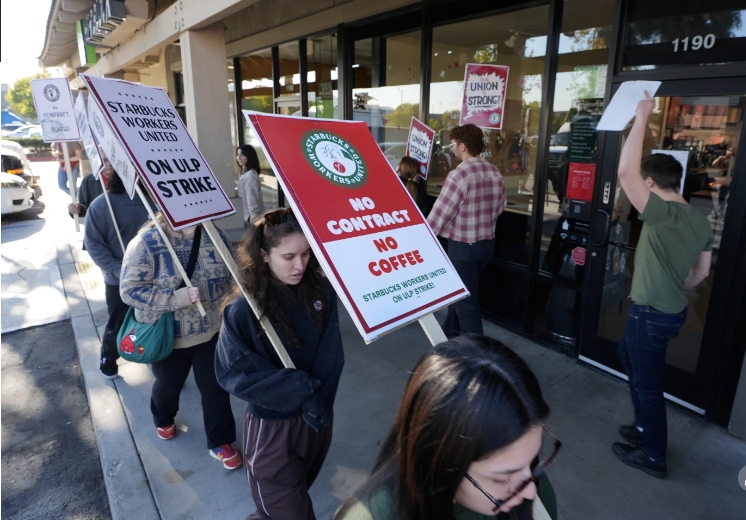
As of Monday afternoon, according to union data from the organization, a five-day strike initiated by Starbucks baristas has resulted in the closure of 59 stores. The strike started last Friday in Los Angeles, Chicago, and Seattle, where Starbucks is headquartered, and then spread to stores in Boston, Dallas, and Portland, Oregon. Employees from cities such as New York, Denver, and Pittsburgh also joined the protest over the weekend.
This strike was mainly organized spontaneously by employees, aiming to fight for better working conditions and salary benefits, reflecting the increasingly strong demand for the protection of workers' rights and interests. Since 2021, the organizational process of Starbucks employees has accelerated, with multiple stores establishing unions and making demands to the company's management for salary adjustments, improved working environments, and employee benefits. However, in multiple negotiations, Starbucks management and employees failed to reach an agreement, leading to a gradual escalation of the strike activity.
Last year, Starbucks opened new stores in multiple cities, but as employee dissatisfaction intensified, some stores began to face staffing shortages. The scale of the strike rapidly expanded, affecting multiple major cities such as New York, Los Angeles, and Chicago. Many stores had to temporarily close, causing inconvenience to regular customers and attracting widespread attention from all sectors of society.
The employees who participated in the strike stated that their working conditions urgently need to be improved, and many feel physically and mentally exhausted under the impact of high-intensity work pressure. An employee who participated in the strike expressed their thoughts on social media: "We hope the company can listen carefully to our voices, improve the working environment, raise salary levels, and ensure that the basic rights of employees are protected." In response, a Starbucks spokesperson stated that the management has always welcomed employee feedback and emphasized that the company is committed to effective communication with employees to resolve differences. Despite differing opinions on certain issues, the company remains committed to maintaining a good working environment and will continue to promote dialogue with employees.
However, in the face of the increasingly severe strike wave, industry experts pointed out that Starbucks' strike not only reflects internal management issues within the company, but also reveals the challenges faced by the entire catering industry in terms of employee rights. As more and more workers begin to pay attention to their own rights, similar strikes may become more frequent in the future.
Sociologists believe that strikes are not only an important means for workers to protect their own rights and interests, but also a driving force for social progress. In recent years, the phenomenon of employees organizing unions has been increasing in the United States, and workers in various industries are actively seeking better working conditions and living standards. The Starbucks strike will undoubtedly provide an example for other businesses, encouraging more employees to unite and fight for fairer treatment.
Despite the impact of the strike on Starbucks' operations, the company still maintains its business through online channels and delivery services. Starbucks stated that they will continue to monitor the development of the situation and strive to find solutions to restore normal operations of their stores.
In the future, how Starbucks and its employees seek consensus in negotiations and resume normal operations will become a focus of attention for the industry and the public. This strike incident will further promote social attention to workers' rights and encourage enterprises to reflect and improve on management and employee communication at a deeper level. With the development of strike activities, Starbucks is facing unprecedented challenges. Regardless of the final negotiation outcome, the voices of employees will become an important force that cannot be ignored within the industry.

The U.S. third-quarter GDP growth rate, strikingly highlighted at 4.3%, not only surpassed market expectations but also earned the label of "the fastest in two years."
The U.S. third-quarter GDP growth rate, strikingly highligh…
Recently, US personnel intercepted a "Century" super oil ta…
According to Xinhua News Agency, the subtle changes in the …
The rapid development of artificial intelligence has brough…
In December 2025, Taiwan's political scene was shaken by a …
When Apple appears for the Nth time on the list of penaltie…